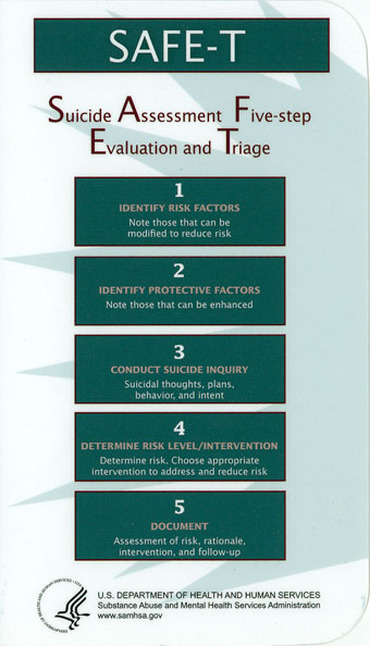
As one of the resources describes, determining how to treat or support a patient who is suicidal is based upon the physician's initial psychiatric assessment of the patient, the patient's physical health status and wishes, how "at risk" they are deemed to be by the healthcare team, and after consideration of the patient's protective factors. While in some cases the treatment may seem somewhat clear, such as a patient who has overdosed on medication and requires medical treatment, or the patient who is experiencing substance-induced psychosis and requires being kept in hospital for further evaluation, there will be times when making a decision surrounding a patient who is suicidal is more challenging.
While, most hospitals or medical facilities have a crisis team or mental health professionals on call, those in rural or remote areas may lack access to psychiatrists or other mental health facilities and be faced with greater responsibility in managing these patients. In any case, clinicians should conduct thorough assessments, try to collaborate with the patient and come up with a plan of action together, and involve family members and mental health professionals (ex. social worker) if possible to together ensure the patient's continued safety.
For those in rural or remote communities, telepsychiatry is a growing area of medicine and psychiatry, and will likely be a viable and very useful option in the future. Already certain areas in the US and Canada are implementing telepsychiatry programs, which not only allow healthcare professionals to consult with one another, but allow patients in areas without adequate resources to speak to/be assessed by a psychiatrist or mental health professional. More information about telepsychiatry, including some preliminary research on it's utility and cost-effectiveness are also included below.
"Evaluations and Treatment of Patients with Suicidal Ideation" by Michael Gliatto and Anil Ray (American Family Physician)
- Provides basic information on the assessment of patients who are suicidal, a simple algorithm for treatment, and information on hospitalizing, prescribing medications and discharging/referring to outpatient programs
"Mental Health for Emergency Departments" (Australia - NSW Health Department)
- A very detailed resource for emergency room clinicians that provides information on triaging and assessing patients with mental health complaints, managing these patients (including those who are suicidal and other topics such as when to sedate or use restraints)
"Working With A Client Who Is Suicidal" (Simon Fraser University and BC Ministry of Health)
"Suicide Prevention Strategies" by J. John Mann, Alan Apter, Jose Bertolote, Annette Beautrais, Dianne Currier, Ann Haas, Ulrich Hegerl, Jouko Lonnqvist, Kevin Malone, Andrej Marusic, Lars Mehlum, George Patton, Michael Phillips, Wolfgang Rutz, Zoltan Rihmer, Armin Schmidtke, David Shaffer, Morton Silverman, Yoshitomo Takahashi, Airi Varnik, Danuta Wasserman, Paul Yip, Herbert Hendin (JAMA)
"Emergency Telepsychiatry" by P Yellowlees, MM Burke, SL Marks, DM Hilty, JH Shore.
"Managing Suicides Via Videoconferencing in a Remote Northern Community in Canada" by Michael Jong
"Telepsychiatry: Getting Help to Kids Where They Live" by Mary Sheppard
 RSS Feed
RSS Feed
